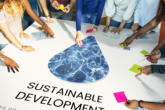
The IB has published the new Global Politics Subject Guide. This will impact teaching and learning starting in August 2024, with the first exams in 2026.
A new subject guide can be daunting, especially when it is the first revision of a relatively new course, as is the case with Global Politics. Dr Michael O’Shannassy, one of the authors of Pearson’s brand-new Global Politics for the IB Diploma textbook (published in April 2024) has come up with a summary of his (IB-appropriate) top seven points to consider.
1. Nature of the subject, aims, and objectives
The nature of the subject section in the Subject Guide outlines the focus of the course which is to encourage students to understand more about “the world they live in, what makes it change, or what prevents it from changing.” There is greater emphasis on the interdisciplinary nature of Global Politics and an increased emphasis on students’ engagement with a wide range of contemporary political issues and challenges, focusing particularly on the understanding of power and its role in political systems. There is also a more explicit focus on how the course “integrates concepts, content, and contexts through inquiries centered on power and political issues.”
The aims of the new Subject Guide spotlight how students will actively engage in global politics by exploring and evaluating power, examining the interaction between state and non-state actors, analysing political issues from multiple perspectives, and fostering a commitment to global citizenship. This is further reflected in the assessment objectives section of the Guide, which emphasizes broad goals like understanding power relationships and political concepts, applying, and analysing these in various contexts, synthesizing and evaluating global politics perspectives, and researching and communicating about political issues.
2. Concepts
The number of key concepts has been reduced from sixteen to four: Power, Sovereignty, Legitimacy, and Interdependence. These concepts should continue to aid students in cultivating a comprehensive grasp of the subject and establishing connections to content and real-world contexts.
3. Content
There are no significant changes to the content with both SL and HL students covering the same essential subject matter. However, there are some changes to how this material is presented. Rather than four core units centered around the theme of ‘People, Power, and Politics’ the new Subject Guide contains a single core unit – Understanding Power and Global Politics – and three thematic studies: Rights and Justice; Development and Sustainability and Peace and Conflict. There has been a small decrease in the recommended teaching hours for this common content.
4. Approach
The reframing of the syllabus described above provides teachers with multiple options when it comes to how they structure their students’ learning experience. Teachers can still proceed sequentially by considering the core unit and then each of the three thematic studies sequentially but the new Subject Guide’s explicit focus on connections, conceptual understandings, and inquiry around political issues invites educators and students to “take an integrated approach in engaging with the syllabus.”
For example, core topics can be studied as introductory (foundational) topics or through each of the thematic studies. Alternatively, the core could be taught separately with the remainder of the course taught through a series of case studies that draw upon the concepts and content contained within the thematic studies. Whatever the case, the flexibility that has been built into the new Subject Guide offers exciting possibilities for both teachers and students by enhancing their comprehension of global politics through the establishment of connections across the syllabus.
5. HL Extension – Global Political Challenges (GPCs)
Two additional HL topic areas – Technology and Equality – have been added to the existing six GPCs (Borders, Environment, Poverty, Identity, Security, and Health). HL students are still expected to conduct independent research on case studies that connect to these topic areas and there is an explicit focus on understanding the interconnections between multiple topic areas, rather than approaching them as discrete, independent topics. The number of recommended teaching hours for this has been reduced slightly.
6. Internal Assessment
One of the most significant changes is the removal of the HL Oral Presentation. For both SL and HL students, the Engagement Project continues to be a requirement. All students are expected to concentrate on analysing power and agency within a local or community context, combining research with experiential learning. However, HL students will now undertake extra research to arrive at a recommendation aimed at resolving the political issue they have identified. The number of recommended teaching hours for this assessment component has been increased slightly at both the SL and HL. While the overall weighting for HL IA remains unchanged, it has been slightly increased for SL students.
7. External Assessment
Paper 1 remains unchanged for both SL and HL students in terms of its form, structure, timing, and weighting. Paper 2 remains an extended response paper, but the structure, timing, and weighting of the paper have changed for both HL and SL students. HL students will now complete a new Paper 3 instead of the HL Oral Extension. This new Paper 3 is a stimulus-based paper focusing on global political challenges, where students can utilize case studies from their research to answer questions. The change aims to allow more in-depth exploration and analysis of these topic areas and the interconnections that exist between them.
What do you think?
Do you agree or disagree with this list? What are your observations and key takeaways from the new Subject Guide and syllabus? Head to our post on our Pearson International Schools Facebook page to share your thoughts and to join in with the conversation.
Discover our brand-new IB Diploma Global Politics student book
Written and reviewed by experienced IB teachers for the 2024 Subject Guide for first assessments in 2026 – coming in print and digital format in early 2024. Sign up to your free 60-day trial or download a free sample chapter now.
Subscribe to our blog
If you’d like to stay up to date with our latest articles, why not subscribe to our blog? You’ll get a fortnightly roundup of the articles you’ve missed straight to your inbox, plus links to free teaching resources.

